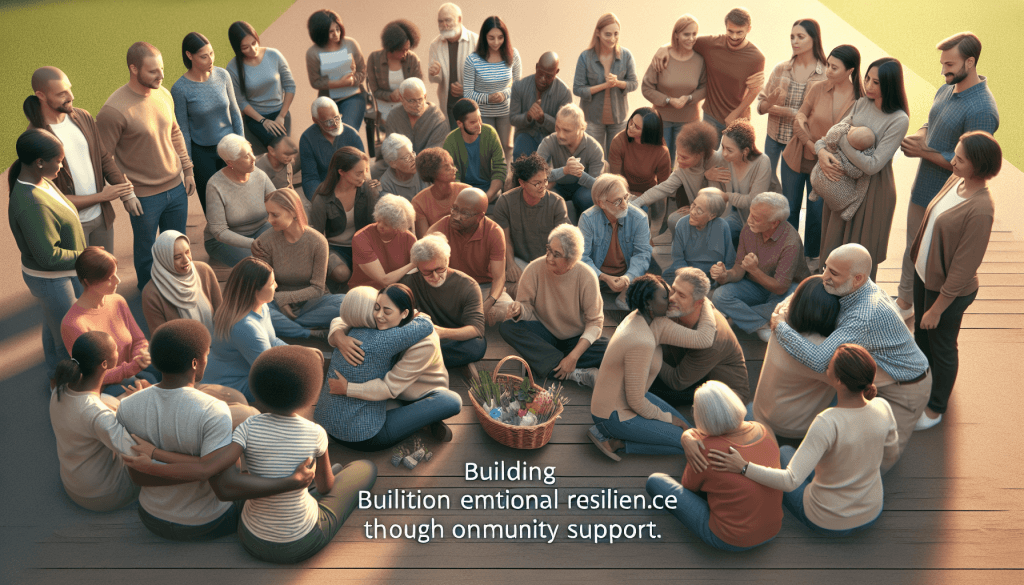Building emotional resilience is like constructing a sturdy bridge that helps you cross the turbulent waters of life’s challenges. Community support acts as the pillars that hold this bridge steady, ensuring you don’t get swept away by the currents. But why should you care about emotional resilience and community support? Because they are your secret weapons for navigating life’s ups and downs with grace and strength. Keep reading to discover how you can harness the power of community to build your emotional resilience and thrive in the face of adversity.
Key Takeaways
- Emotional resilience is the ability to bounce back from adversity.
- Community support plays a crucial role in building resilience.
- Strong social connections improve mental health and well-being.
- Engaging with community resources can enhance emotional wellness.
- Shared experiences and empathy reduce stress and foster resilience.
Introduction to Emotional Resilience
Definition of Emotional Resilience
Emotional resilience is your ability to adapt and recover from stress, adversity, or trauma. Think of it as your mental armor, protecting you from life’s slings and arrows. It’s not about avoiding challenges but facing them head-on and emerging stronger.
Importance of Community Support in Building Resilience
Community support is like a safety net, catching you when you fall and helping you bounce back. It provides a sense of belonging and connection, which are essential for emotional resilience. When you have a strong support system, you’re better equipped to handle life’s challenges.

The Interconnection Between Resilience and Mental Health
How Resilience Impacts Mental Health
Resilience and mental health are like two sides of the same coin. When you’re resilient, you’re less likely to be overwhelmed by stress and more likely to maintain a positive outlook. This, in turn, boosts your mental health and overall well-being.
Role of Community Support in Mental Well-being
Community support acts as a buffer against stress and anxiety. It provides a sense of security and comfort, knowing that you’re not alone in your struggles. Whether it’s a friend lending an ear or a neighbor offering a helping hand, community support can significantly improve your mental well-being.

Strengthening Social Connections
Building Healthy Support Systems
Importance of Strong Social Bonds
Strong social bonds are like the roots of a tree, anchoring you firmly in the ground. They provide stability and nourishment, helping you grow and thrive. When you have a network of supportive relationships, you’re more resilient to life’s challenges.
Ways to Strengthen Social Connections
Strengthening social connections doesn’t have to be complicated. It can be as simple as reaching out to a friend, joining a club, or volunteering in your community. These activities help you build meaningful relationships and create a sense of belonging.
Benefits of a Supportive Community
A supportive community offers numerous benefits, from emotional support to practical assistance. It can help you navigate difficult times, celebrate successes, and find joy in everyday moments. When you’re part of a supportive community, you’re never alone in your journey.

Tips for Improving Resilience Through Community Support
Seeking Support from Friends and Family
Open Communication
Open communication is the cornerstone of any strong relationship. It involves expressing your thoughts and feelings honestly and listening to others with empathy and understanding. By fostering open communication, you can strengthen your bonds with friends and family.
Active Listening
Active listening is more than just hearing words; it’s about understanding the emotions and intentions behind them. When you practice active listening, you show others that you value their perspective and are genuinely interested in what they have to say.
Engaging with Community Resources
Local Support Groups
Local support groups offer a safe space to share experiences and learn from others. They provide a sense of community and belonging, helping you build resilience through shared understanding and support.
Online Communities
Online communities can be a valuable resource for building resilience. They offer a platform to connect with others who share similar experiences, providing support and encouragement from the comfort of your home.

Adapting to Tough Times with Community Backing
Coping Strategies During Difficult Periods
When life throws you a curveball, having a community to lean on can make all the difference. They can offer practical advice, emotional support, and a shoulder to cry on. By developing effective coping strategies, you can navigate tough times with resilience and grace.
Examples of Community Support in Action
Community support comes in many forms, from organized events to spontaneous acts of kindness. Whether it’s a neighborhood cleanup or a fundraising event, these examples demonstrate the power of community in building resilience and fostering a sense of belonging.

Enhancing Emotional Wellness Through Shared Experiences
Connecting with Others Who Share Similar Experiences
Connecting with others who have faced similar challenges can be incredibly healing. It provides a sense of validation and understanding, reminding you that you’re not alone in your struggles. By sharing your experiences, you can build resilience and find strength in solidarity.
The Role of Empathy and Understanding
Empathy and understanding are the glue that holds communities together. They foster a sense of connection and compassion, helping you build meaningful relationships and enhance your emotional wellness.
Reducing Stress Through Community Engagement
Activities and Events that Foster Community Involvement
Community activities and events provide opportunities to connect with others and reduce stress. Whether it’s a local festival, a charity run, or a book club meeting, these events foster a sense of community and belonging.
The Impact of Community Engagement on Stress Levels
Engaging with your community can significantly reduce stress levels. It provides a sense of purpose and fulfillment, helping you focus on the positive aspects of life and build resilience.

Coping with Loss and Leaning on Community Support
Utilizing Community Resources for Grief Support
Grief can be an overwhelming experience, but community resources can provide much-needed support. From counseling services to support groups, these resources offer a safe space to process your emotions and find comfort in the company of others.
Building a Network of Support During Times of Loss
Building a network of support during times of loss can help you navigate the grieving process with resilience. By leaning on your community, you can find strength and solace in shared experiences and understanding.
Conclusion
Recap of the Importance of Community Support
Community support is a vital component of emotional resilience. It provides a sense of belonging, connection, and security, helping you navigate life’s challenges with strength and grace.
Encouragement to Build and Maintain Strong Community Ties
Building and maintaining strong community ties is an investment in your emotional well-being. By fostering meaningful relationships and engaging with your community, you can build resilience and thrive in the face of adversity. So, reach out, connect, and let your community be your anchor in life’s stormy seas.
For more insights on building resilience, check out this guide from the American Psychological Association. You can also explore effective ways to build resilience and learn about developing resilience through various strategies.
Building Emotional Resilience Through Community Support: Your FAQ Guide to Thriving Together
What is emotional resilience and why is it important?
Emotional resilience refers to the ability to adapt to stressful situations and bounce back from adversity. It’s important because it helps individuals manage stress, maintain balance in their lives, and improve their overall well-being.
How does community support enhance emotional resilience?
Community support provides a network of relationships that offer emotional, informational, and practical assistance. This support can help individuals feel valued, understood, and less isolated, which strengthens their ability to cope with challenges.
What are some examples of community support systems?
Examples include support groups, social clubs, religious organizations, online communities, and neighborhood associations. These systems offer various forms of support, from emotional encouragement to practical help.
How can I find a supportive community?
Start by identifying your interests and needs, then look for local groups or online forums that align with them. Attend meetings or events to meet like-minded individuals and gradually build connections.
What role does communication play in building community support?
Effective communication is crucial for building trust and understanding within a community. It involves active listening, empathy, and openness, which help foster strong, supportive relationships.
Can online communities be as effective as in-person ones?
Yes, online communities can be just as effective, especially for those who may not have access to local support. They offer flexibility and a wide range of perspectives, though it’s important to ensure they are safe and respectful spaces.
How can I contribute to a supportive community?
Contribute by being an active participant, offering help when needed, and sharing your experiences. Encouraging others and showing empathy can also strengthen the community’s overall resilience.
What are some challenges in building emotional resilience through community support?
Challenges include finding the right community fit, overcoming personal barriers to seeking help, and maintaining consistent engagement. It’s important to be patient and persistent in building these connections.
How can I measure my progress in building emotional resilience?
Progress can be measured by reflecting on how you handle stress and adversity over time. Notice improvements in your coping strategies, emotional responses, and overall sense of well-being.
Are there any resources available to help build emotional resilience through community support?
Yes, there are numerous resources such as books, podcasts, workshops, and online courses focused on emotional resilience and community building. Many organizations also offer free or low-cost support services.



